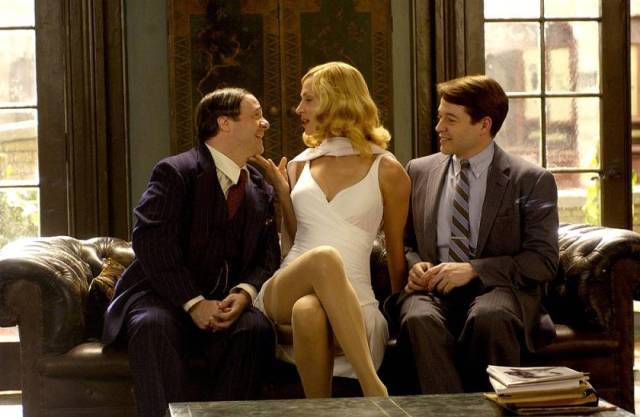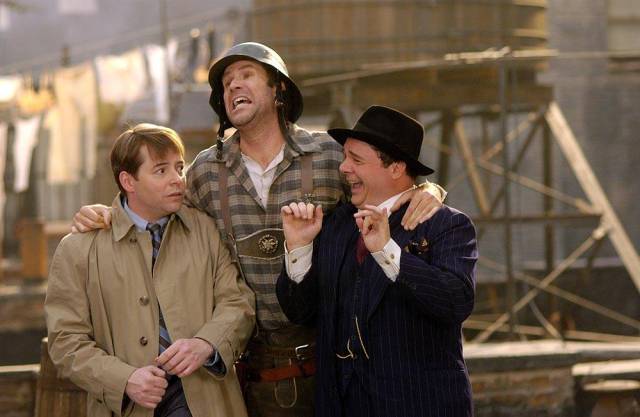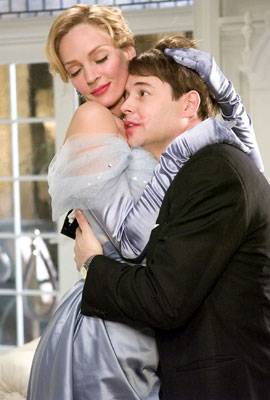
Stage-bound, creaking, its post-sync as ill-matched as its lip-synching, and in a lighting scheme that suggests Mel Brooks has stiffed Con Edison, The Producers, a coruscatingly witty 1968 cinematic joy turned Broadway musical, comes back to film in cadaverous condition.
The eminent, not exquisite, corpses are Nathan Lane and Matthew Broderick, stars of the long-running play, which I have not seen, and poor substitutes for the real Bialystock and Bloom, the great Zero Mostel and the once-great Gene Wilder. Peculiar for two actors who’ve shared a stage for a thousand and one nights, Lane and Broderick are wooden, devoid of rapport; their line readings smack of a first run-through, as if they met only milliseconds before someone called, “Action!”
Whereas Wilder’s Bloom was a genuine neurotic, the robotic Broderick, trapped in stasis between the infantile and the doddering, might be playing Ferris Bueller’s Geriatric Day Off. Small, physically ugly, incapable of springing surprise, Broderick here sports a face dipped in formaldehyde, his airbrushed baby cheeks at odds with double chins and a deep crevasse carved across the full width of his lower forehead. As a comic, he is flat; as a song and dance man, woefully deficient. Broderick renders the repressed accountant Leo Bloom as both an adenoidal, fey wisp (shades of Johnny Depp’s horrible non-performance in Charlie and the Chocolate Factory) and a brash loudmouth. Broderick supplies neither shadings nor modulations, as (perhaps) to be expected in the absence of a true comedian’s timing or instincts.
As for Lane as Max Bialystock, theatrical impresario of surefire flops, he’s pale, empty compared to Zero Mostel. Lane’s every gesture and syllable are perfunctory. He lacks the manic, self-loathing, slightly dangerous quality present in Mostel. A narcissist and a showman, Lane couldn’t be more self-satisfied. Mostel was uncomfortable with himself; that was the gift. Lane, by contrast, comes across as too smugly well-adjusted, too pampered, too lavishly over-praised for his calculated mediocrity to be anything other than…Nathan Lane.
Susan Stroman, director and choreographer of the stage musical, helms the film in lieu of Brooks, who co-wrote (with Thomas Meehan) and co-produced this monument to studied, laborious slapstick, replete with gags less fit for a wax museum than for a mortuary. The precious old deeds from ’68 are reprised yet not resuscitated. “I’m hysterical and I’m wet,” and “You’re gonna jump on me!” are present, but there’s nothing to them or in them this time.

An unnecessary Jon Lovitz, cigar in mouth, as the boss at Bloom’s accounting house, presides over drones who crunch numbers in lockstep misery, and he provides someone for Broderick to rebel against. His swarthy, crisp skin stretched beyond crease point, Lovitz looks simultaneously embalmed and baked alive in a tanning booth. When a gaggle of pearl-capped chorus girls metastasizes from the vaults of the firm to lead Bloom on a supposedly merry, Busby Berkeley-esque fantasy number, even that’s dull: their moribund hoofing has no snap, crackle, pop.
Stroman’s worst mistake was allowing Will Ferrell to be cast as the lederhosen-clad Nazi playwright Franz Liebkind, author of the “gay romp” Springtime for Hitler, which Bialystock produces in gleeful hope of lucrative ruin. (Alas, I am not going to give you a plot summary, thereby forfeiting any shot of ever being called “descriptive” by Michael Tortorello.) Of all the meager non-entities catapulted out of well-deserved obscurity by the repulsive Saturday Night Live, perhaps one or two of them are more scabrous than Ferrell, but here, shot in close-ups that impale us with his rows and rows and rows of crooked teeth, no one else seems as grossly untalented or as painfully overexposed. Ferrell unceasingly exudes an aura of faking it, of trying too hard, of completely, utterly, and thoroughly failing to convince as anything other than an overgrown fraternity boy. He’s the sort of gimmicked-up “comedian” whom only an alt-weakly film “critic” could love. (Brian Miller, anyone?) Ferrell couldn’t approximate Kenneth Mars’ effortless madness if he tried, and all the washed out Ferrell does is try, in both senses of the word.
The movie’s nadir, however, arrives in the “Keep it Gay” number, which introduces us (at some length) to Bialystock’s choice of a director, someone who’ll be sufficiently competent to close Springtime for Hitler on the same night that it opens. In the role of Roger de Bris, the 57-year-old Gary Beach is merely grotesque. With his jowly face, his stretch marked waddle of a neck, and his vamp and camp in-drag preening, Beach seems destined to be anointed with that sleaziest Medallion of the Vulgar, an Academy Award. In fairness, the way Stroman shoots “Keep it Gay” and the way Brooks and Meehan wrote it, no actors on planet Earth could have escaped unscathed.
 On the bright side, Uma Thurman has a pleasant enough singing voice and an even more pleasing figure. Her Swedish secretary, Ulla, represents the sole improvement over ’68. At one point, she wears a spangled evening gown that’s the color of twilight, as she dances exuberantly in a softly lit, all-white room. Thurman has the glamour that the old-time movie stars had, and in this sequence, the movie’s best, The Producers comes briefly to life. Ulla and Bloom are mutually attracted, and when they perform a duet (“That Face”) Thurman energizes Broderick. The song itself isn’t anything memorable, but it summons a reasonable facsimile of the movie musical magic that we long to see recreated.
On the bright side, Uma Thurman has a pleasant enough singing voice and an even more pleasing figure. Her Swedish secretary, Ulla, represents the sole improvement over ’68. At one point, she wears a spangled evening gown that’s the color of twilight, as she dances exuberantly in a softly lit, all-white room. Thurman has the glamour that the old-time movie stars had, and in this sequence, the movie’s best, The Producers comes briefly to life. Ulla and Bloom are mutually attracted, and when they perform a duet (“That Face”) Thurman energizes Broderick. The song itself isn’t anything memorable, but it summons a reasonable facsimile of the movie musical magic that we long to see recreated.
Stroman cuts from this to the auditions for Hitler. No one could replace Dick Shawn, who was riotously funny in ‘68, and the filmmakers don’t even try. After a few barely amusing geezers flub their tryouts, we’re given Ferrell again, laying an egg in his solo number.
At the beginning of the play within the movie, the irresistible title song isn’t nearly as well staged as in the original film. Stroman’s bargain basement opulence adds nothing. The standout here is a spot-on turn from the tenor John Barrowman, in a swastika and SS officer’s uniform, his chestnut hair dyed Dietrich-blond. Singing the lead, Barrowman looks a little like Jude Law, only a Jude Law with some spontaneity still coursing through his veins. The choice of Barrowman was good casting. He conveys a sense of fun with the lunacy he’s asked to do, and what’s more, as the lone honest-to-God trained singer on this sinking ship, Barrowman knows how to use the voice, something Broderick and Lane do not.
When the Springtime opening night patrons rise to leave, their sensibilities assaulted by what they see and hear on stage, there’s a slight cultural chasm at work. It was possible in 1968 to believe that theatre audiences would be offended by a show tune that purports to glorify Hitler; it isn’t – even in a farce – remotely believable in 2005. “Such bad taste!” a couple of haughty, well-heeled bluebloods exclaim, but if only bad taste now were as innocent and as playful as this! Bad taste in movies and television, forgive me for not citing any relevant pop academics, has been for some time hateful, violent, not particularly enjoyable if you’re out of the loop on sadism.
Still, Brooks and company realize that there would be no Producers were it not for that snappy tune for all seasons, “Springtime for Hitler.” Even I found it impossible not to tap my toes when a bevy of stormtroopers formed a chorus line; Stroman’s choreography here shows a bit of spark, and who wouldn’t be moved by Barrowman and massed voices rising in “Springtime for Hitler and Germany, winter for Poland and France. We’re marching to a faster pace. Look out, here comes the master race…”
The movie ought to have ended there. Instead, it drags on (no pun intended) for a small eternity in which Lane performs a tenebrous solo in the slammer, an interminable, soporific song about his betrayal at the hands of Bloom. Clearly, Brooks and Stroman intend this showstopper to encase Lane’s supposedly considerable talent – it doesn’t; it felt like padding.
Seated directly behind me at the preview screening I attended, a middle-aged, lower middle class, Jabba the Hutt-sized, popcorn-munching hag croaked in approval (that was her laugh) at everything on-screen. It is precisely for her kind that this Producers exists.
Summing up: it’s a stinkeroo to end all stinkeroos, a Thanksgiving turkey, and a lump of coal in this year’s horror-day stocking all meretriciously rolled into one. – NPT
November 22, 2005

You must be logged in to post a comment.